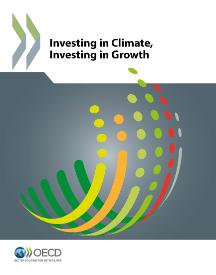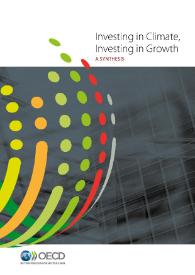Croissance, investissement et transition à faible teneur en carbone
Video
Investing in Climate, Investing in Growth
Governments around the world are facing the imperatives of re-invigorating growth while improving livelihoods and urgently tackling climate change. The OECD report Investing in Climate, Investing in Growth provides an assessment of how they can generate inclusive economic growth in the short term, while making progress towards climate goals to secure sustainable long-term growth.
Synthesis - Executive Summary - Technical note
Explore more dataviz
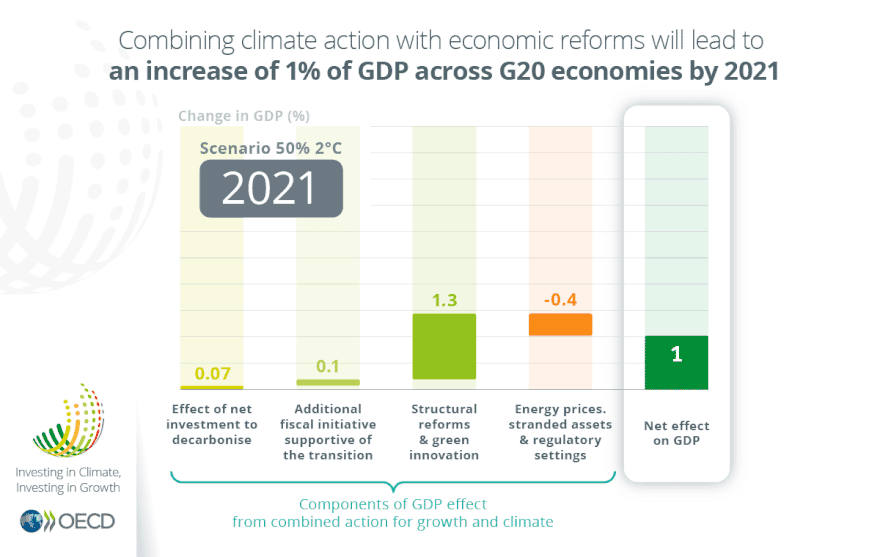
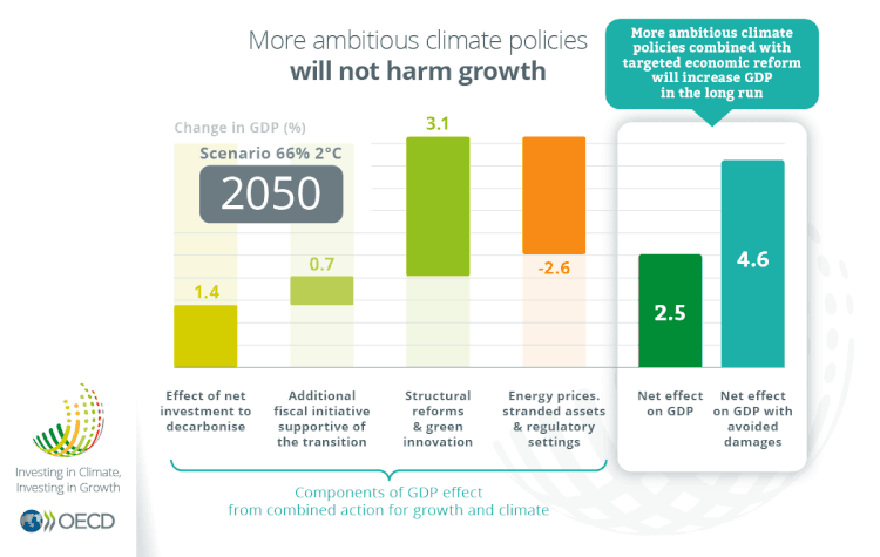
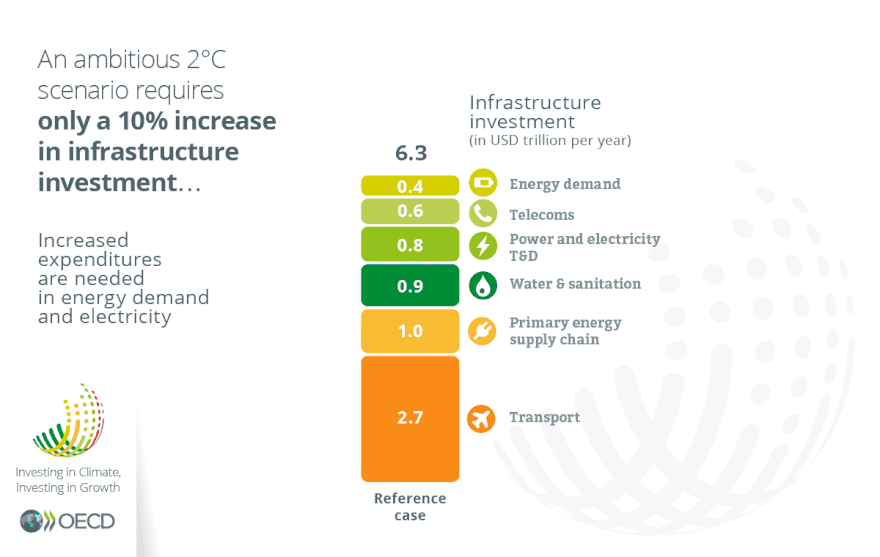
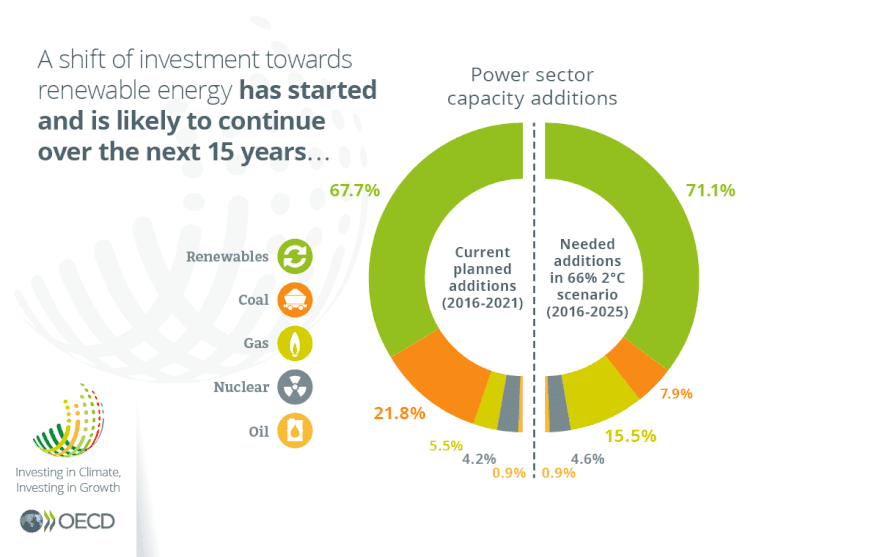
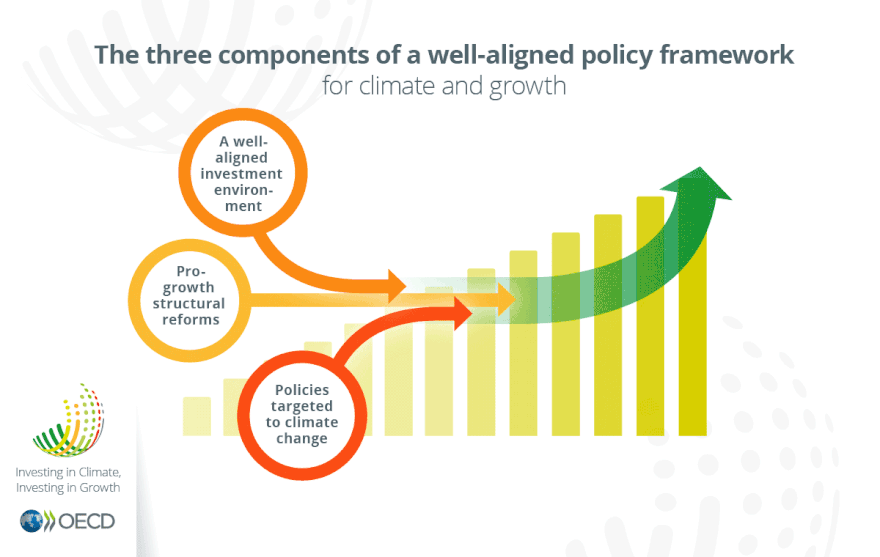
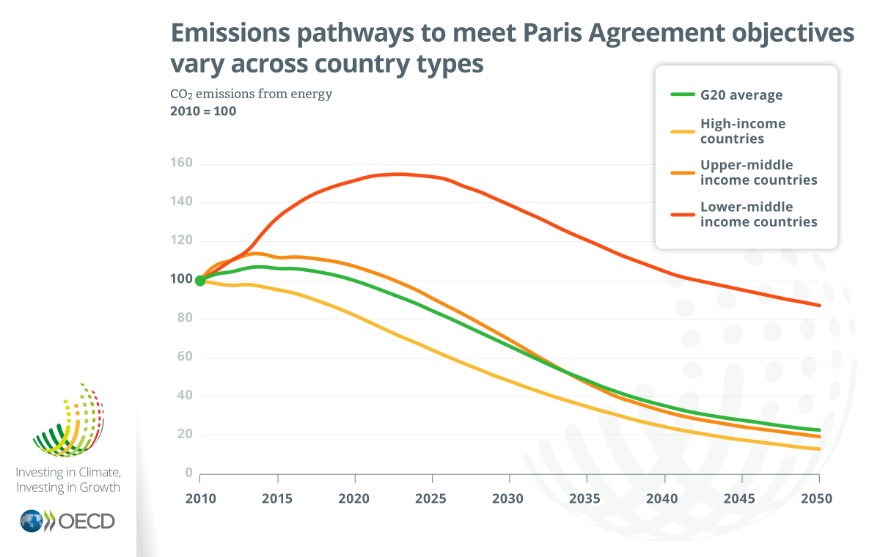
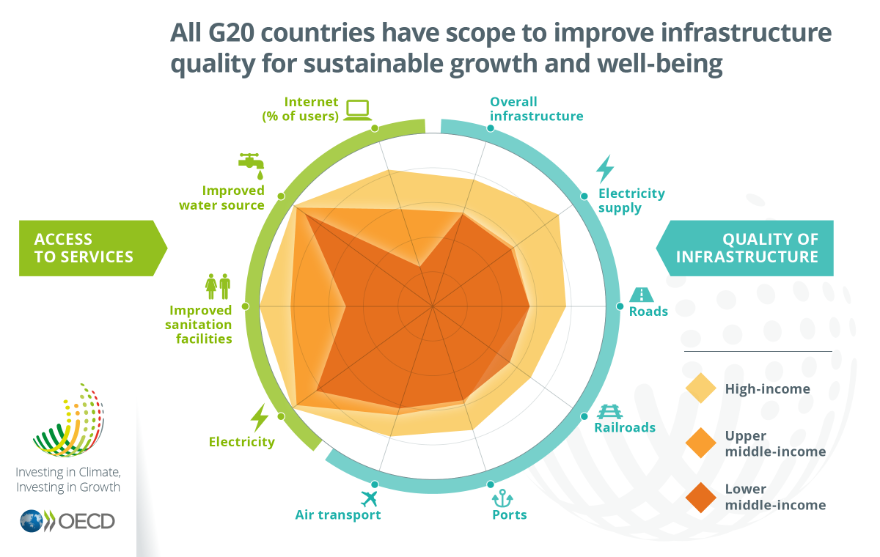
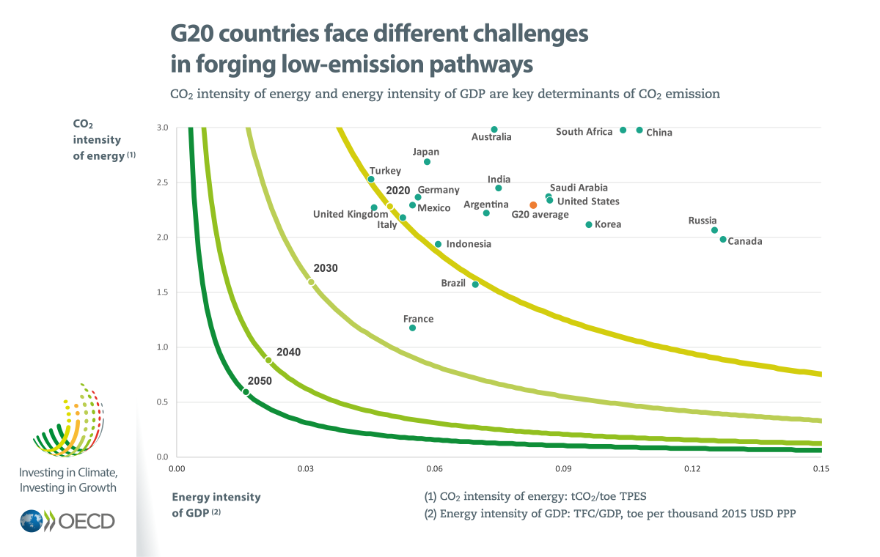
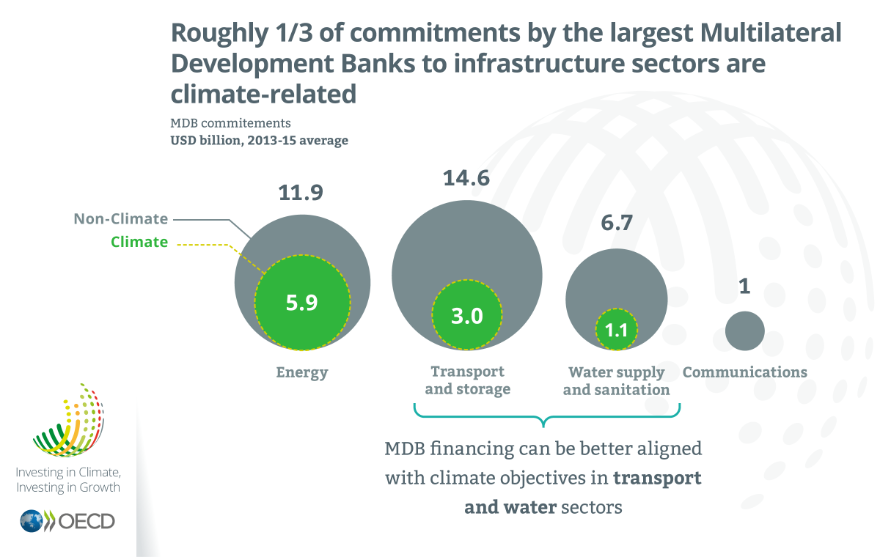
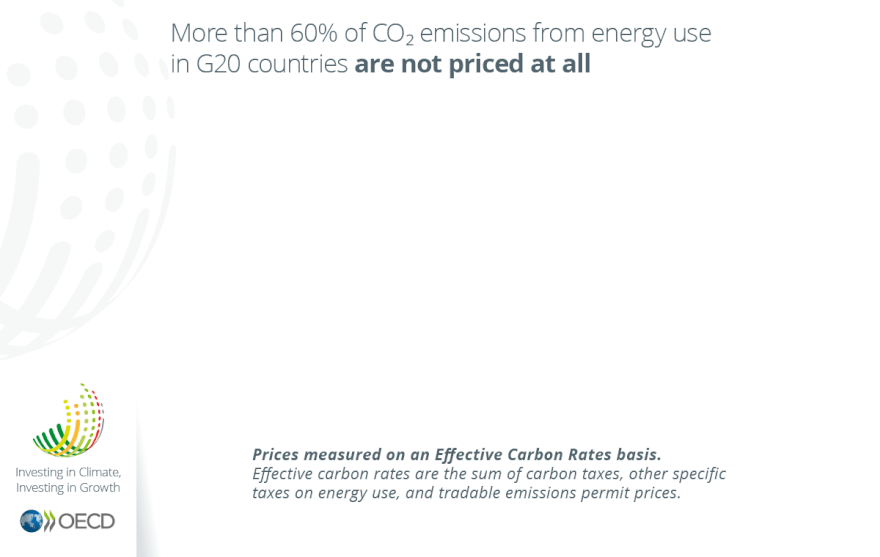
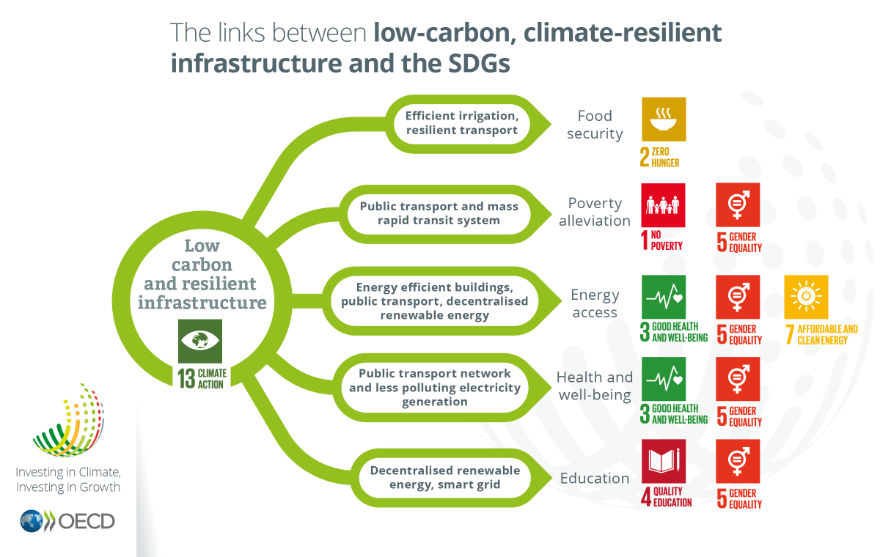
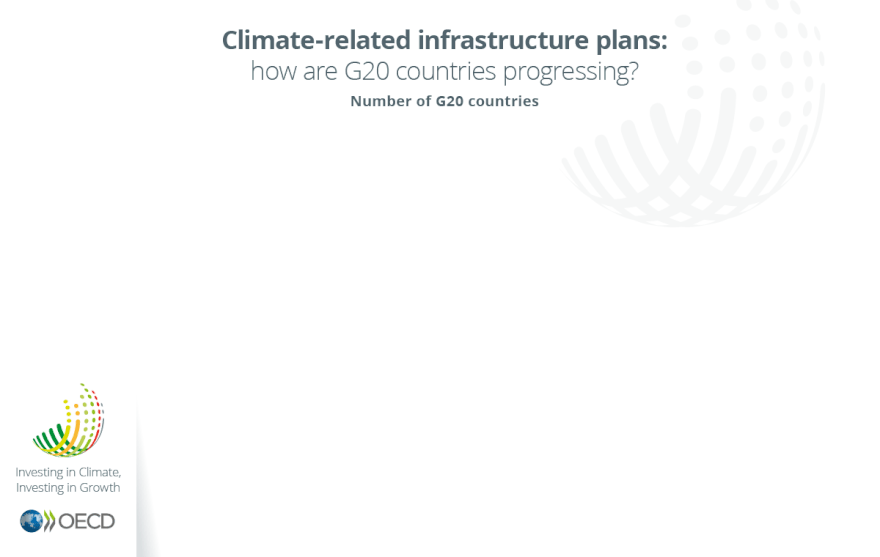
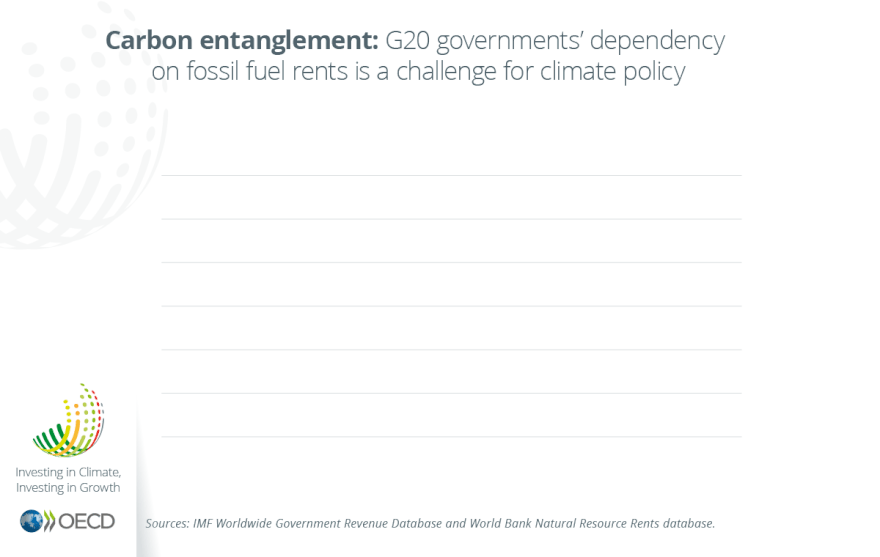
Blogs and articles
- On the occasion of the Paris One Planet Summit, read the latest blogs and articles related to the OECD action on climate change - December 2017
- "Moving forward on climate: Looking beyond narrow interest" by Anthony Cox, OECD Acting Director, OECD Environment Direcotate, OECD Insights
National governments must take the lead and do so with a recognition that they are part of a global effort.” Speaking last week at the Munk School of Global Affairs in Toronto, OECD Secretary-General Angel Gurría urged countries not to retreat behind their national borders in dealing with climate change. A purely inward-looking approach to climate change is clearly inadequate as we see signs that short-term national self-interest is increasingly seeping into the global debate on climate action... Read the full blog post.
- "What's Good for the Climate Can Be Good for Growth Too" by Catherine L. Mann, OECD Chief Economist, Huffington Post
On the one hand, governments are striving to re-ignite growth in a world of slowing productivity growth and rising inequality. Economic growth has been at best modest in the last decade in most G20 economies. The OECD projects a moderate pick-up of world GDP of around 3.5% in 2017 and 2018. But this will not suffice to maintain good levels of pensions, health and education, nor to create sufficient jobs for the young... Read the full op ed.
- "Climate: Towards a just transition, with no stranded workers and no stranded communities" by Sharan Burrow, General Secretary, International Trade Union Confederation (ITUC), OECD Insights
Ambitious action on climate is an imperative. The G20 leaders have a chance to reinforce the Paris Climate Agreement and raise ambition with concrete measures to ensure significant progress towards net zero economies and reap the benefits of investment now in jobs and economic growth... Read the full blog post.
- "Opening a new chapter in the infrastructure of Latin America", by Juan Pablo Bonilla, Manager of the Climate Change and Sustainable Development Sector, Inter-American Development Bank (IDB), OECD Observer
In Latin America, as elsewhere, sustainable infrastructure plays a vital role in improving the quality of life and supporting economic growth. What many people don’t know is that sustainable infrastructure also has a lasting impact on climate resilience. Every year, natural disasters generate US$2 billion in costs in Latin America, not counting the incalculable loss of human life: in Colombia, my own country, the April 2017 rain-driven mudslides took the lives of more than 250 people... Read the full blog post. - "Getting climate infrastructure right - A stronger role for development banks", by Jorge Moreira da Silva, Director of the OECD Development Co-operation Directorate, Devex
The 2015 Paris Agreement stipulates that global warming needs to be limited to well below 2 degrees Celsius to reduce the impact of climate change on human life. Yet, with the world’s population set to rise by more than 2 billion by 2030, the coming decade will see a leap in infrastructure investment — transportation, energy, water and sanitation — which could make or break the 2 degree goal... Read the full op ed.
Events - Press releases - Speeches
dissemination activities and outreach
Since the launch of the report "Investing in Climate, Investing in Growth" in Germany in May 2017, find out more on our communication activities and outreach events held in Australia, Brazil, Canada, China, France, Germany, Indonesia, Mexico, South Africa, Sweden and the United States.
More events are being organised throughout 2018.
Dissemination activities and outreach for OECD report "Investing in Climate, Investing in Growth" from OECD Environment
LAUNCH EVENT - 23 May 2017
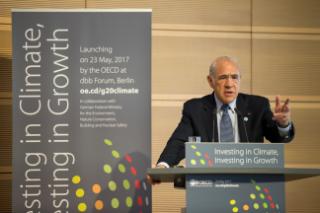
The OECD-hosted international conference, in collaboration with the German Ministry of Environment, Nature Conservation, Building and Nuclear Safety and in conjunction with the Petersberg Climate Dialogueconference took place in the context of the German G20 presidency and attended by decision-makers from a large number of countries, business representatives as well as high-level actors of international co-operation.
The OECD Secretary-General Angel Gurría presented the results of this major report which provides a ground-breaking analysis of how low-emission and climate-resilient development can be achieved without compromising economic growth, competitiveness or well-being.
The programme and some of the questions debated at the event:
- How can governments ensure that climate-friendly growth policies provide a major boost to short-term growth while increasing longer-term resilience?
- What development pathways will get us to the Paris Agreement outcomes?
- How do investment flows need to change to get us there? What are the growth and structural implications of going low carbon?
- How can governments create the conditions to drive a prosperous transition?
- Press release: Taking action on climate change will boost economic growth, says OECD
- Speech: International conference: Investing in Climate, Investing in Growth - Introductory remarks by Angel Gurría
- Speech: Petersberg Climate Dialogue: Investing in Climate, Investing in Growth - Remarks by Angel Gurría
Download the Summary of Discussion - Launch event (PDF)
2017 OECD press releases, STATEMENT and speeches
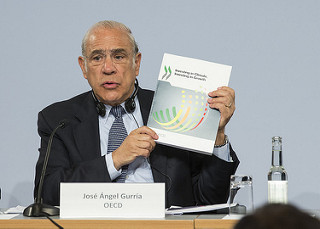
Press releases
- OECD, France and Mexico launch "Paris Collaborative on Green Budgeting" at One Planet Summit, December
- OECD’s Gurría calls for renewed international commitment to fighting climate change, November
- OECD’s Gurría reaffirms need for global cooperation amid progress at G20 Summit, July
- Taking action on climate change will boost economic growth, says OECD, May
Statement
Speeches
- One Planet Summit: Investing in climate, investing in growth through green budgeting and clean energy finance, December
- The High Level Breakfast on Insitutional Investors and the Low Carbon Transition, December
- Munk School of Global Affairs: Climate Action - Time for implementation, including the full the speech "Climate Action: Time for implementation" (PDF version), November
Video
- Video recording of the speech "Climate action: Time for implementation" by OECD Secretary-General Angel Gurría, Munk School of Global Affairs, November
International Seminars
- 20 December -
- 12 December -
- July - Speech: Pretoria Seminar "Investing in Climate, Investing in Growth" by Angel Gurría
July - OECD at the G20 Hamburg Summit
The OECD work and the OECD report "Investing in Climate, Investing in Growth" have been recognised and welcomed in the G20 Leaders' Declaration, which is a strong endorsement of the message that climate and growth policies must go hand-in-hand.
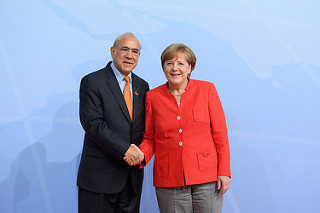
G20 Summit Declaration of the Heads of State and Government
- G20 Leaders' Declaration
- Speech: , July
G20 Summit - Agreed document
PAST EVENTS
- 14 November 2017 COP23 Germany-OECD side event: Initiating a just transition to a low-carbon, climate resilient future, Bonn
- 24 July 2017 , Cape Town
- 25 July 2017 , Pretoria. Remarks by Angel Gurríal
- February 2017 OECD Roundtable on scaling up investment in low-carbon and climate-resilient infrastructure, Paris
A number of expert workshops have taken place to feed into the project:
- April 2017 , Beijing
- March 2017 Workshop on Growth, Investment and the Low-Carbon Transition in India, New Delhi
- January 2017 , Paris
- November 2016 , Paris
- November 2016 , Casablanca
- November 2016 OECD Workshop on financing green infrastructure, Paris
Related event:
- March 2017 Presentation of the IEA/IRENA study on “Global Energy Transition: Shifting Investments for Decarbonisation”, Berlin Energy Transition Dialogue
Knowledge Partners papers
Project Background
The OECD undertook a major project on the economic growth and investment implications of the transition to a low-carbon, climate resilient economy in the context of the German G20 Presidency.
Bringing together the growth, development and climate agendas
Delivering on the Paris objectives will require fundamental shifts in our economies, including major changes in how capital is allocated.
The Growth, Investment and the Low-Carbon Transition project analyses how low-emission and climate-resilient development can be achieved without compromising economic growth, competitiveness, or well-being across the G20 group of countries and beyond.
Invigorating economic growth in the short-term does not necessarily equate with investing in emissions-intensive infrastructure and locking-in a high-carbon pathway. Escaping the low-growth trap that many countries currently find themselves in does not mean embracing a high-carbon future complete with future economic liabilities in terms of stranded assets and physical damages due to climate change impacts.
The project looks at a number of key questions surrounding the low-carbon transition:
- 1. What development pathways will get us to the Paris outcome?
- 2. How do investment flows need to change to get us there?
- 3. What are the growth and structural implications of going low-carbon?
- 4. How can governments create the conditions to drive a prosperous transition?
An inclusive process relevant to all G20 countries
The project is being undertaken as part of the OECD’s Programme of Work and Budget with the support of the German Federal Ministry for the Environment, Nature Conservation, Building and Nuclear Safety, and in the context of the German G20 Presidency. It is guided by an Advisory Council of 14 high-profile academic, government, business and civil society members. The work also benefits from the input of a number of partner institutions from G20 countries, covering the range of issues being addressed.
Stay in touch
To receive Environment newsletters (latest publications and reports, events and Green Talks Live):
- Register to MyOECD, or login to MyOECD if you already have an account (registration is free)
- Select "Edit profile" and make sure the “Environment” centre of interest is selected
- Under "Newsletters", select "Environment"
- to validate, click on "submit"
To contact us:
- send an email to env.contact@oecd.org.

